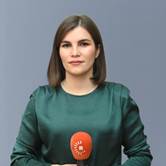KYIV, Ukraine – Ukraine's fight against the Russian invasion is a fight for "freedom and democracy against dictatorship and totalitarianism," the International Legion's spokesperson told Rudaw, calling his fighters' decision to enlist more than just about fighting Russia.
"It's a fight for freedom and democracy against dictatorship and totalitarianism and imperialism and expansionism," Damien Magrou, spokesperson for the International Legion for the Defense of Ukraine told Rudaw on Thursday, explaining his fighters' perspective by calling their values universal and not limited to the war.
Describing the demographics of the legion, Magrou said most legionnaires come from Europe and North America, with the US, UK, Canada, and Poland being the most represented nationalities.
The International Legion does not offer proper military training, and only accepts applicants with previous military experience because there is no time for full military training, according to the spokesperson.
"Most of our legionnaires are veterans from the war in Afghanistan and Iraq," he added, also noting that "quite a few" who have previously fought alongside the Kurdish People's Protection Units (YPG) in Syria have joined the legion.
The biggest accomplishment for the International Legion was the retake of the town of Irpin from Russian forces, the spokesperson noted, calling their efforts a "substantial contribution."
Magrou said that the force experienced a spike in recruits after the atrocities of the Bucha killings were made public, after dozens of bodies were found lying in the streets and mass graves were uncovered following the withdrawal of Russian forces from the town. He mentioned that the number of people joining now has stabilized.
Russian President Vladmir Putin launched an invasion of Ukraine on February 24, sparking widespread international condemnation and a large exodus of civilians from the invaded country. More than eight million have been displaced in Ukraine since the start of the war, and over 6.5 million have fled to international borders for safety, according to the United Nations International Organization for Migration (IOM).
"Everyone who's in the International Legion who's fighting for Ukraine today, they're doing it because they want to defend the values that Ukraine has adhered to ... and Ukraine has made its choice – towards Europe and democracy," Magrou continued.









Comments
Rudaw moderates all comments submitted on our website. We welcome comments which are relevant to the article and encourage further discussion about the issues that matter to you. We also welcome constructive criticism about Rudaw.
To be approved for publication, however, your comments must meet our community guidelines.
We will not tolerate the following: profanity, threats, personal attacks, vulgarity, abuse (such as sexism, racism, homophobia or xenophobia), or commercial or personal promotion.
Comments that do not meet our guidelines will be rejected. Comments are not edited – they are either approved or rejected.
Post a comment